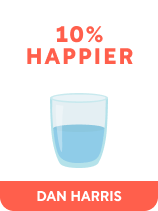

This article is an excerpt from the Shortform book guide to "10% Happier" by Dan Harris. Shortform has the world's best summaries and analyses of books you should be reading.
Like this article? Sign up for a free trial here .
Is Dan Harris’s book 10% Happier worth reading? What are the pros and cons of the book and how was it received upon publication?
Former ABC News anchor Dan Harris believes anyone can benefit from meditation. In 10% Happier, he offers a skeptic’s journey through the world of self-help following his meltdown on live television. Harris explains how meditation allowed him to get control of his anxiety, manage his ego, and become a more compassionate person.
Below is our 10% Happier review complete with an analysis of the context and approach.
10% Happier Overview
Our 10% Happier review begins with a brief overview of the book. In 10% Happier, former ABC News anchor Dan Harris discusses how he was able to get control of his anxiety and calm the negative voice in his head through meditation, despite his skepticism of self-help programs.
Harris describes the events that led him to start practicing meditation, including a meltdown on live television, and he explores a number of self-help ideas from popular gurus. He explains principles of Buddhism, the concepts of mindfulness, and meditation for skeptics.
Along the way, Harris debunks a few common misconceptions about meditation: that mindfulness makes you a pushover, makes you less successful, inhibits creativity, or requires perfection in order to be effective.
About the Author
Harris is a retired American journalist, former ABC News correspondent, and writer. He appeared on “Nightline,” “World News Tonight,” “20/20,” and “Good Morning America.” He covered stories on a wide range of topics, from evangelical culture wars to the attack on 9/11. Harris has written reports from all over the world, including Afghanistan, Haiti, and Cambodia. He won an Edward R. Murrow Award for a report about a young Iraqi man moving to America and an Emmy Award for his “Nightline” report on child trafficking. In 2021, he retired from journalism to focus on promoting the benefits of meditation.
Harris published two more books on meditation, and he now has a podcast where he continues to explore the topic of mindfulness.
Connect with Dan Harris:
The Book’s Publication
10% Happier was published by HarperCollins in 2014. It was Harris’s first book on meditation. In 2015, he published Hoist On My Own Petard, which discusses his experience after writing 10% Happier. In 2017, he published another meditation guide, Meditation for Fidgety Skeptics.
Historical Context
According to some archaeologists, meditation dates back to 5,000 B.C., although scholars debate the exact origins. The first mention of meditation is found in Hindu texts. The practice gradually spread throughout Asia along the Silk Road, which was a network of trade routes that connected the East and West.
By the 18th century, meditation became a topic for philosophers, such as Voltaire. But it wasn’t until the 20th century that it caught on in mainstream Western cultures. In the 1960s, researchers began studying the effects of meditation. Western meditation focused on relaxation and self-improvement instead of spiritual development. The practice found popularity with celebrities like The Beatles. In the 1990s, Oprah endorsed Deepak Chopra’s book Ageless Body, Timeless Mind, which advocated that people meditate to combat the aging process. As more celebrities praised meditation and more research reported benefits, Westerners embraced meditation.
More recently, meditation has continued to enter the mainstream, and its reach has grown in the digital age, with websites and apps devoted to it and major corporations incorporating it into their employee benefits packages. The Centers for Disease Control and Prevention (CDC) has reported that meditation was the fastest-growing health trend in recent years.
Intellectual Context
Harris narrates his journey through the world of self-help in the 2000s. Self-help aims to guide people to emotional, financial, and intellectual improvement through books, speeches, and courses. As traditional organized religion became less popular in the 21st century, self-help gained traction as people found fulfillment in the genre’s ideas. However, some people have called self-help (an over-$11 billion industry) a “religion for capitalists.”
There have been countless books published on many different aspects of self-help, from decluttering your home to developing financial freedom. Harris’s book lies within the niche of those trying to help you find meaning in everyday life (such as Minimalism), harness your thoughts (like The Secret), and change your daily habits (like Atomic Habits). His tone also mirrors other self-help books that aim to be accessible and practical, in order to appeal to career-minded people looking for productivity boosts (like The Subtle Art of Not Giving a F*ck).
Despite the popularity of the self-help industry, there is an equal amount of skepticism and aversion to it. Many people are wary of pseudoscientific claims, as well as the hypocrisy of gurus who don’t follow their own advice or have made millions of dollars from their ideas. Other critics have noted that most self-help isn’t actually original, as many gurus get their ideas from Buddhism, Greek Stoicism, and classic philosophy.
Harris, a self-help skeptic, came to this realization about meditation and Buddhism. As he made his way through self-help ideas, he discovered that the parts of self-help philosophy that resonated with him were actually principles of Buddhism.
The Book’s Impact
10% Happier became a New York Times bestseller, and it won the 2014 Living Now Book Award for Inspirational Memoir. The book established Harris’s position as a meditation advocate, and he has shifted his focus from journalism to promoting mindfulness through his meditation books and app.
Critical Reception
Many readers liked Harris’s practical and honest approach to meditation, particularly since Harris was a self-help skeptic and successful journalist. Most readers appreciated that he answered common questions about meditation and Buddhism in a way that wasn’t overly scientific. However, some critics wanted more information and self-help guidance from the book, while others thought it could be condensed.
Commentary on the Book’s Approach and Organization
The book takes an autobiographical approach to explaining meditation concepts. Harris narrates his journey through the world of self-help. He doesn’t bombard the reader with statistics, instead describing the benefits of meditation, principles of Buddhism, and common self-help philosophies in a colloquial way. As a result, the book acts as a layperson’s guide to self-help or advice from a friend.
The book is organized chronologically, detailing Harris’s life and the events that resulted in him starting to meditate. At the end of the book, Harris includes a “how-to” section on different kinds of meditation, how to get started with your meditation practice, and answers to common questions about meditation.

———End of Preview———
Like what you just read? Read the rest of the world's best book summary and analysis of Dan Harris's "10% Happier" at Shortform .
Here's what you'll find in our full 10% Happier summary :
- A skeptic’s journey through the world of self-help
- How to control your anxiety, manage your ego, and become more compassionate
- How you can improve your life and career—even by just 10%






